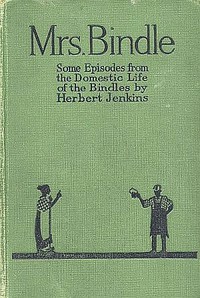Mrs. Bindle: Some Incidents from the Domestic Life of the Bindles, Jenkins [popular romance novels TXT] 📗

- Author: Jenkins
Book online «Mrs. Bindle: Some Incidents from the Domestic Life of the Bindles, Jenkins [popular romance novels TXT] 📗». Author Jenkins
Twenty minutes elapsed before Mrs. Bindle returned with the announcement that the signalman had telegraphed to West Boxton for a cart.[Pg 164]
"Well, well," said Bindle philosophically, "it's turnin' out an 'appy day; but I could do with a drink."
An hour later a cart rumbled its noisy way up to the station, outside which stood the Bindles and their luggage. A business-like little boy scout slid off the tail.
"You want to go to the Camp?" he asked briskly.
"Well," began Bindle, "I can't say that I——"
"Yes," interrupted Mrs. Bindle, seeing in the boy scout her St. George; "we got out at the wrong station." She looked across at Bindle as she spoke, as if to indicate where lay the responsibility for the mistake.
"All right!" said the friend of all the world. "We'll soon get you there."
"An' who might you be, young-fellow-my-lad?" enquired Bindle.
"I'm Patrol-leader Smithers of the Bear Patrol," was the response.
"You don't say so," said Bindle. "Well, well, it's live an' learn, ain't it?"
"Now we'll get the luggage up," said Patrol-leader Smithers.
"'Ow 'Aig an' Foch must miss you," remarked Bindle as between them they hoisted up the tin-bath; but the lad was too intent upon the work on hand for persiflage.
A difficulty presented itself in how Mrs. Bindle was[Pg 165] to get into the cart. Her intense sensitiveness, coupled with the knowledge that there would be four strange pairs of male eyes watching her, constituted a serious obstacle. Young Tom, in whom was nothing of the spirit of Jack Cornwell, and his friend the old porter made no effort to disguise the fact that they were determined to see the drama through to the last fade-out.
Bindle's suggestion that he should "'oist" her up, Mrs. Bindle had ignored, and she flatly refused to climb the spokes of the wheel. The step in front was nearly a yard from the ground, and Mrs. Bindle resented Young Tom's sandy leer.
It was Patrol-leader Smithers who eventually solved the problem by suggesting a dandy-chair, to which Mrs. Bindle reluctantly agreed. Accordingly Bindle and the porter crossed arms and clasped one another's wrists.
Mrs. Bindle took up a position with her back to the tail of the cart, and the two Sir Walters bent down, whilst Patrol-leader Smithers turned his back and, with great delicacy, strove to engage the fixed eye of Young Tom; but without success.
"Now when I says 'eave—'eave," Bindle admonished the porter.
Gingerly Mrs. Bindle sat down upon their crossed hands.
"One, two, three—'eave!" cried Bindle, and they heaved.
There was a loud guffaw from Young Tom, a stifled scream, and Mrs. Bindle was safely in the cart; but[Pg 166] on her back, with the soles of her elastic-sided boots pointing to heaven. Bindle had under-estimated the thews of the porter.
"Right away!" cried Patrol-leader Smithers, feeling that prompt action alone could terminate so regrettable an incident, and he and Bindle clambered up into the cart, where Mrs. Bindle, having regained control of her movements, was angrily tucking her skirts about her.
The cart jerked forward, and Young Tom and his colleague grinned their valedictions, in their hearts the knowledge that they had just lived a crowded hour of glorious life.
The cart jolted its uneasy way along the dusty high-road, with Bindle beside the driver, Mrs. Bindle sitting on the blankets as grim as Destiny itself, engaged in working up a case against Bindle, and the boy scout watchful and silent, as behoves the leader of an enterprise.
Bindle soon discovered that conversationally the carter was limited to the "Aye" of agreement, varied in moments of unwonted enthusiasm with an "Oh, aye!"
At the end of half an hour's jolt, squeak, and crunch, the cart turned into a lane overhung by giant elms, where the sun-dried ruts were like miniature trenches.
"Better hold on," counselled the lad, as he made a clutch at the Japanese basket, which was in danger of going overboard. "It's a bit bumpy here."[Pg 167]
"Fancy place in wet weather," murmured Bindle, as he held on with both hands. "So this is the Surrey Summer-Camp for Tired Workers," and he gazed about him curiously.[Pg 168]
CHAPTER VIII THE SUMMER CAMP FOR TIRED WORKERSThe Surrey Summer-Camp for Tired Workers had been planned by the Bishop of Fulham out of the largeness of his heart and the plenitude of his inexperience in such undertakings. He had borrowed a meadow, acquired a cow, hired a marquee, and wangled fifty army bell-tents and a field-kitchen, about which in all probability questions would be asked in the House. Finally as the result of a brain-wave he had requisitioned the local boy scouts. Later there would be the devil to pay with the leaders of the Boys' Brigade; but the bishop abounded in tact.
When the time came, the meadow was there, the bell-tents, the cow, and the boy scouts duly arrived; but of the marquee nothing had been seen or heard, and as for the field-kitchen, the War Office could say little beyond the fact that it had left Aldershot.
For days the bishop worked indefatigably with telephone and telegraph, endeavouring to trace the errant field-kitchen and the missing marquee; but[Pg 169] so much of his time had been occupied in obtaining the necessary assistance to ensure that the cow was properly and punctually milked, that other things, being farther away, had seemed less insistent.
In those days the bishop had much to worry him; but his real cross was Daisy, the cow. Everything else was of minor importance compared with this bovine responsibility. Vaguely he had felt that if you had a cow you had milk; but he was to discover that on occasion a cow could be as unproductive of milk as a sea-serpent.
None of the campers had ever approached a cow in her professional capacity. Night and morning she had to be relieved of a twelve hours' accumulation of milk, all knew that; but how? That was a question which had perturbed bishop and campers alike; for the whole camp shared the ecclesiastical anxiety about Daisy. Somewhere at the back of the cockney mind was the suspicion, amounting almost to a certainty, that, unless regularly milked, cows exploded, like overcharged water-mains.
Daisy soon developed into something more than a cow. When other occupations failed (amusements there were none), the campers would collect round Daisy, examining her from every angle. She was a mystery, just as a juggler or the three-card trick were mysteries, and as such she commanded respect.
Each night and morning the bishop had to produce from somewhere a person capable of ministering to the requirements of Daisy, and everyone in the neighbour[Pg 170]hood was extremely busy. Apart from this, West Boxton was a hot-bed of Nonconformity, and some of the inhabitants were much exercised in their minds as to the spiritual effect upon a Dissenter of milking a church cow.
There were times when the bishop felt like a conjurer, billed to produce a guinea-pig from a top-hat, who had left the guinea-pig at home.
Daisy was not without her uses, quite apart from those for which she had been provided by Providence and the bishop. "Come an' 'ave a look at Daisy," had become the conversational forlorn hope of the campers when utterly bankrupt of all other interests. She was their shield against boredom and the spear with which to slay the dragon of apathy.
"No beer, no pictures, only a ruddy cow," a cynic had remarked in summing up the amusements provided by the Surrey Summer-Camp for Tired Workers. "Enough to give a giddy flea the blinkin' 'ump," he had concluded; but his was only an isolated view. For the most part these shipwrecked cockneys were grateful to Daisy, and they never tired of watching the milk spurt musically into the bright pail beneath her.
The bishop was well-meaning, but forgetful. In planning his camp he had entirely overlooked the difficulty of food and water supplies. The one was a mile distant and could not be brought nearer; the other had been overcome by laying a pipe, at considerable expense.
In the natural order of disaster the campers had[Pg 171] arrived, and in a very few hours became tinctured with the heresy of anti-clericalism. Husbands quarrelled with wives as to who should bear the responsibility for the adventure to which they found themselves committed. One and all questioned the right of a bishop to precipitate himself into the domestic circle as a bearer of discord and summer-camps.
At the time of the arrival of the Bindles, everything seemed chaos. There was a spatter of bell-tents on the face of the meadow, piles of personal possessions at the entrance of the tents, whilst the "tired workers" loitered about in their shirt sleeves, or strove to prepare meals in spite of the handicaps with which they were surrounded. The children stood about wide-eyed and grave, as if unable to play their urban games in a bucolic setting.
When, under the able command of Patrol-leader Smithers, the Bindles' belongings had been piled up just inside the meadow and Mrs. Bindle helped down, sore in body and disturbed in temper, the indefatigable boy scout led the way towards a tent. He carried the Japanese basket in one hand, and the handleless bag under the other arm, whilst Bindle followed with the tin-bath, and Mrs. Bindle made herself responsible for the bundle of blankets, through the centre of which the parrot-headed umbrella peeped out coyly.
Their guide paused at the entrance of a bell-tent, and deposited the Japanese basket on the ground.
"This is your tent," he announced, "I'll send one of the patrol to help you," and, with the air of one[Pg 172] upon whose shoulders rests the destiny of planets, he departed.
Bindle and Mrs. Bindle gazed after him, then at each other, finally at the tent. Bindle stepped across and put his head inside; but quickly withdrew it.
"Smells like a bus on a wet day," he muttered.
With an air of decision Mrs. Bindle entered the tent. As she did so Bindle winked gravely at a little boy who had wandered up, and now stood awaiting events with blue-eyed gravity. At Bindle's wink he turned and trotted off to a neighbouring tent, from the shelter of which he continued to watch the domestic tragedy of the new arrivals.
"There are no bedsteads." Mrs. Bindle's voice came from within the tent in tones of muffled tragedy.
"You don't say so," said Bindle abstractedly, his attention concentrated upon a diminutive knight of the pole, who was approaching their tent.
"Where's the feather beds, 'Orace?" he demanded when the lad was within ear-shot.
"There's a waterproof ground-sheet and we supply mattresses of loose straw," he announced as he halted sharply within two paces of where Bindle stood.
"Oh! you do, do you?" said Bindle, "an' who 'appens to supply the brass double-bedstead wot me and Mrs. B. is used to sleep on. P'raps you can tell me that, young shaver?"
Before the lad had time to reply, Mrs. Bindle appeared[Pg 173] at the entrance of the tent, grimmer and more uncompromising than ever. For a moment she eyed the lad severely.
"Where am I to sleep?" she demanded.
"Are you with this gentleman?" enquired the boy scout.
"She is, sonny," said Bindle, "been with me for twenty years now. Can't lose 'er no'ow."
"Bindle, behave yourself!" Mrs. Bindle's jaws closed with a snap.
"We're going to 'ave some sacks of straw in place of that missionary's bed you an' me sleeps on in Fulham," explained Bindle; but Mrs. Bindle had disappeared once more into the tent.
For the next hour the Bindles and their assistant scout were engaged in getting the bell-tent into habitable condition. During the process the scout explained that the marquee was to have been used for the communal meals, which the field-kitchen was to supply; but both had failed to arrive, and the bishop had himself gone up to London to make enquiries.
"An' wot's goin' to 'appen to us till 'e runs acrost 'em?" enquired Bindle. "I'm feelin' a bit peckish myself now—wot I'll be like in a hour's time I don't know."
"I'll show you how to build a scout-fire," volunteered the lad.
"But I ain't a fire-eater," objected Bindle. "I want a bit o' steak, or a rasher an' an egg."
"What's the use of a scout-fire to me with kippers[Pg 174] to cook?" demanded Mrs. Bindle, appearing once more at the entrance of the tent.
At that moment another "tired worker" drifted across to the Bindles' tent. He was a long, lean man with a straggling moustache and three days' growth of beard. He was in his shirt sleeves, collarless, with unbuttoned waistcoat, and he wore a general air of despondency and gloom.
"'Ow goes it, mate?" he enquired.
Bindle straightened himself from inspecting the interior of the tin-bath which he was unpacking.
"Oh! mid; but I've known wot it is to be 'appier," said Bindle, with a grin.
"Same 'ere," was the gloomy response.
"Things sort o' seem to 'ave gone wrong," suggested Bindle conversationally.
"That's right," said the man, rubbing the bristles of his chin with a meditative thumb.
"'Ow you gettin' on for grub?" asked Bindle.
The





Comments (0)